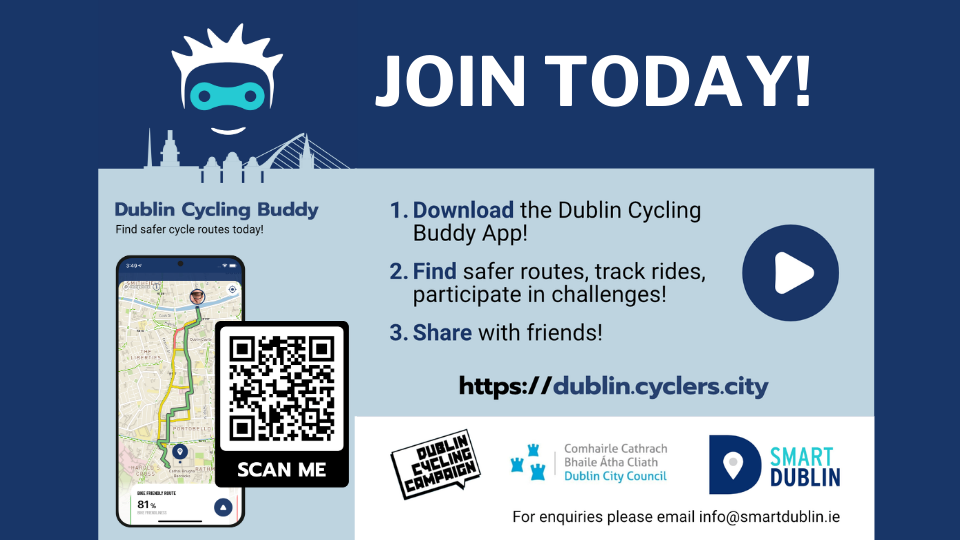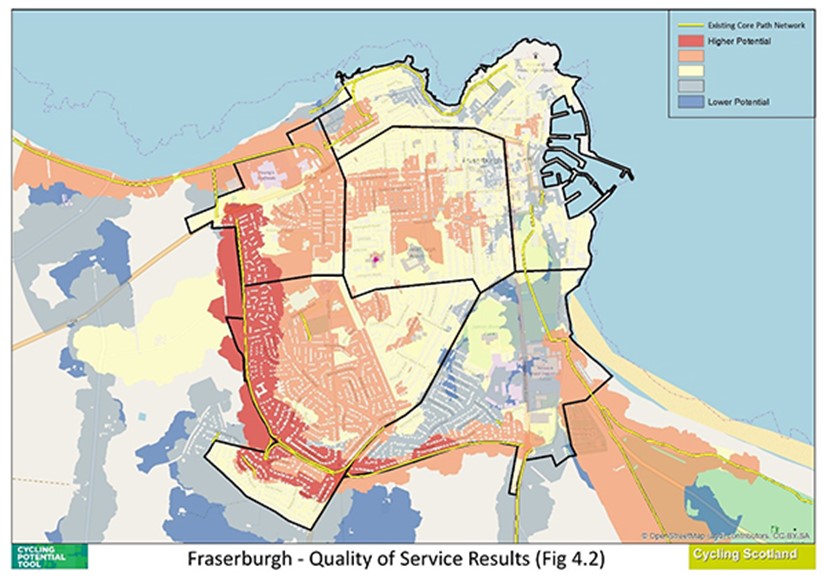Welcome to the Dublin Region Open Data Active Travel Challenge 2021
About the competition
THIS COMPETITION IS NOW CLOSED
The Dublin Region Open Data Active Travel Challenge seeks innovative ideas and applications that use open data to encourage and support active travel. Competition participants have an opportunity to showcase their work, achieve recognition and cash prizes, and potentially make a positive impact on how people circulate around this city region. Entry is open to individuals and groups of all ages and backgrounds through completing a short application form. Closing data for entries is March 30th 2021 at noon.
Why this competition?
The competition organisers realise active travel, primarily walking and cycling, has many benefits. It’s good for our health and wellbeing, it can positively impact on traffic and emissions and, in the current Covid-19 context, it lessons pressures on public transport which is operating at reduced capacity. When emerging from pandemic enforced restrictions, it is imperative to reopen in a way that supports public health and that of our environment. We are also looking to drive engagement and impact from our open data.
What are we looking for?
All ideas are welcome but some key areas of interest in include:
- The school run and work commute: How can we use open data to show the best routes between homes and school/ college/ workplace? What and where are the barriers to walking and cycling and how can we overcome them?
- Busy routes and congestion hotspots: Where are they? What are the emissions and air quality implications? Which interventions might yield positive outcomes?
- Recreation: How can open data inform maps and route planning applications so as to highlight safer, more comfortable or more enjoyable active travel routes?
- Analyses and Visualisations: How can we turn data into insights? For example, where are preferred locations for infrastructure such as footpaths or bike stands? How can bike-share and micro-mobility provision be optimised for public good? And, what do current data and trends tell us about the impact of failing to actively travel on public health or climate action commitments
- Applications and Programmes: How can we use data to promote or gamify active travel and encourage more people to make the transition?
The competition will award prizes to the most innovative and practical ideas that use open data to help encourage more people throughout Dublin to engage in active travel.
Entry
The competition is open to individuals, teams and organisations. Applicants may also apply more than once with different ideas. There is a two stage evaluation process. First, explain your proposal via a short application form. Proposals are shortlisted according to the evaluation criteria set out below and shortlisted participants are given a further eight weeks to develop your ideas and applications. During this period you can expect to avail of advice and support from the competition organising committee. At the end of eight weeks you will be expected to provide a short report and present your work to the evaluators. Closing data for entries is March 30th 2021 at noon. Entries received after this will not be considered.
Prizes
The best solutions will be awarded the following
- First Prize is €1,200
- Second Prize is €600
- Third Prize is €300
Aside from recognition and financial reward, competition participants may benefit from access to and assistance from competition organisers to see their solution through to implementation. However, there is no obligation on organisers to ensure proposed solutions are realised.
Which Open Data?
data.smartdublin.ie is the landing page for Dublinked: the Dublin Region open data repository, we strongly advise you investigate available data on this platform first. Relevant datasets might include:
- Bikeshare schemes: data.smartdublin.ie has historical and near real time data for Dublinbikes, Bleeper bikes and Moby bikes bikeshare schemes.
- Pedestrian footfall and cycle counts are also available here and here.
- Traffic volumes via SCATS, cordon counts and SDCC traffic management.
- Cycle lanes for SDCC and the Region.
Where else can I find open data?
data.gov.ie is the national open data repository and you will find many data sources there. Depending on the proposal, potentially relevant data sources might include: weather data (Met Eireann), air quality and air noise (local authority/ EPA), Census/ POWSCAR/ Travel Survey (CSO), Strava, Schools/ Colleges/ workplace locations (Dept Education, other), traffic incidents and deaths (RSA), footpaths, trails and gradients (OSI). If there is data you would like to use but have difficulty to access, let us know and we can see if extra data can be made available.
How will my entry be evaluated?
Entrants will be scored up to a maximum of 100 points using the following schema:
- Showcasing of open data (30 points)
- Impact potential for active travel (30 points)
- Practicality/ implementation (30 points)
- Originality/ Innovation (10 points)
However, all entries must employ at least two open datasets in order to qualify.
Where can we see successful ideas or get inspiration?
There are a number of solutions which use data to promote and support active travel. Some examples include:
- Maps: for example this map which promotes walking to DCU campus or this online map which identifies bike parking locations:

- Apps: can make active travel more attractive by promoting or gamifying active travel options. For example, the Dublin Cycle Buddy app shows where the closest available bikeshare option from Dublin’s three bikeshare providers, integrating open data from all three in one app:

- Visualisations: turn open data into insight and can be used to underpin action. For example this video shows movement of bikeshare bikes through the day, and might be used to plan re-siting of bikes from full to empty stations and to help plan the locating of new bike stations
One Week on Dulin Bikes, July 2018 from Philip Lowney on Vimeo.
- Policy proposals/ interventions: for locating or widening footpaths, new bike lanes, or improving traffic management. Cycling Scotland, for example, created a Cycling Potential Tool to analyse available datasets and identify where investment in cycling would have greatest benefit.

The above examples are intended to be indicative of some already existing solutions, but we encourage thinking outside the box and welcome as broad a range of innovative ideas as possible.
Dublin Region Open Data Active Travel Challenge Partners
This competition is brought to you by a consortium of partners including; Smart Dublin, Dublin City Council, Dun Laoghaire-Rathdown County Council, Fingal County Council, South Dublin County Council, the National Transport Authority, Technological University Dublin, Cycling Ireland, Get Ireland Walking and Derilinx.
The competition has been funded by the Department of Public Expenditure and Reform’s Open Data Engagement Fund.
Contact
For more information, contact Luke on luke.binns@smartdublin.ie.